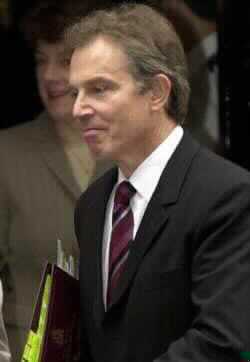Seeking a compromise ahead of a key Security Council meeting on Iraq , British diplomats floated the idea of giving Saddam Hussein a short deadline to prove he has no more banned weapons - or face war. The idea, first discussed by London and Washington several weeks ago, re-emerged as France, Russia and Germany warned that they would block any U.N. authorization for military action and key swing states on the council seemed unwilling to commit to the U.S. position.
Complicating matters for the Bush administration were comments Wednesday from chief U.N. weapons inspector Hans Blix, who said Iraq is now providing "a great deal more" cooperation.
Despite intense lobbying, the United States hasn't been able to muster the minimum nine votes required to adopt a resolution allowing for war against Iraq.
Throughout Wednesday, clusters of Security Council diplomats met in the "delegates' lounge" at the United Nations , sipping coffee from paper cups and going over compromise options.
Russian Ambassador Sergey Lavrov met with Canadian Ambassador Paul Heinbecker, who proposed setting an end-of-March deadline for Iraqi compliance. In another corner, the ambassadors of Mexico, Chile and Pakistan discussed the merits of the British idea.
In the middle of the room, Iraqi Ambassador Mohammed Al-Douri fiddled with a strand of worry beads. At the end of the day, Washington announced that it was expelling two of Al-Douri's staffers, accusing them of engaging "in activities outside the scope of their official function."
Al-Douri described the two men as "security personnel," who live in the basement of the Iraqi mission. According to Al-Douri, the men have until Friday to leave the country.
Secretary of State Colin Powell and several of his counterparts, including Britain's Jack Straw, were due in New York Thursday to begin a final drive of diplomacy to secure U.N. backing for a war in Iraq.
While Washington and London believe they already have the authority they need in previous resolutions to wage war against Iraq, new U.N. support would mean international legitimacy and the chance to share the costs of humanitarian relief and reconstruction.
Powell and others will then attend a Security Council meeting on Friday where Blix and his counterpart, Mohamed ElBaradei, will give briefs on Iraqi cooperation with inspections and disarmament. For many council members, Friday's reports will be key in deciding whether to vote for the U.S.-backed resolution.
Although the Bush administration has sent mixed signals in recent days about when or whether it would call for a vote on the resolution, diplomats said one was expected by March 13.
Secretary-General Kofi Annan appealed this week to the deeply divided council - split between those who believe Iraq can still be disarmed peacefully and those who support the use of force - to find "common ground" when dealing with Saddam.
But neither side showed any movement toward compromise until Wednesday when Britain, under intense pressure at home to get U.N. authorization for a war, began tentatively talking about the possibilities of imposing a deadline on Iraq.
Diplomats, speaking on condition of anonymity, said the ideas being floated wouldn't alter the wording of the U.S.-British-Spanish draft resolution. Instead it would tack on verbally, or in writing, a warning to Saddam to prove within a specific time frame that he has given up weapons of mass destruction.
British Ambassador Jeremy Greenstock told council members last week that the while the current draft resolution would authorize war, adoption didn't mean that war was imminent.
In a preview of his report Wednesday, Blix painted a more positive picture of Iraq's disarmament efforts than he did a week ago, and his comments were in sharp contrast to those delivered minutes later in Washington by Powell.
Powell called inspections futile and said Iraq's "too-little, too-late gestures are meant not just to deceive and delay action by the international community" but rather to create divisions.
Speaking at the United Nations, Blix said he would welcome the continuation of U.N. inspections for several more months and mapped out plans well into the summer.
In a written report to the council last Friday, Blix said Baghdad's disarmament efforts had been "very limited so far." But since that report was written Iraq has made greater efforts, he said.
The destruction of Iraq's Al Samoud 2 missiles, which began Saturday, "is the most spectacular and the most important and tangible" evidence of real disarmament, he said.
In addition, Iraq also "took the initiative" to dig up a site where it said it neutralized and buried 157 R-400 aerial bombs filled with biological agents in 1991 "and they are showing there are more bombs" than previous U.N. inspectors established, he said.
Iraqi scientists are also submitting to private interviews on inspectors' terms.
"You have a greater measure of cooperation on interviews in general," Blix said, noting that seven scientists had recently been questioned privately inside Iraq.
PHOTO CAPTION
British Prime Minister Tony Blair leaves his London residence No.10 Downing Street en-route to the House of Commons for the weekly Prime Ministers Question Time session, Wednesday, March 5, 2003. The British Foreign Secretary Jack Straw and his Russian counterpart Igor Ivanov had a meeting with British Prime Minister Tony Blair earlier in the day. (AP Photo/Richard Lewi
- Author:
AP - Section:
WORLD HEADLINES


 Home
Home Discover Islam
Discover Islam Quran Recitations
Quran Recitations Lectures
Lectures
 Fatwa
Fatwa Articles
Articles Fiqh
Fiqh E-Books
E-Books Boys & Girls
Boys & Girls  Hajj Rulings
Hajj Rulings Hajj Fatwas
Hajj Fatwas














